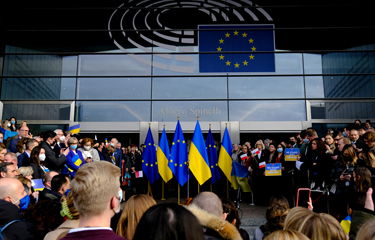The European Parliament will provide financial help to European Union fisheries and aquaculture sectors struggling with the economic consequences of the Russian invasion of Ukraine, including giving compensation to those who have had to stop operating or whose economic viability is threatened.
On Wednesday, 6 July, 2022, Members of European Parliament (MEPs) adopted a measure to support fishers who have had to cease their activities due to the war in Ukraine as well as producers and fishing and aquaculture operators whose activities have been disrupted as a consequence of the conflict.
MEPs also agreed with the European Council to amend the proposal to include those operators and producers whose economic viability was negatively impacted by the war and the processing sector.
E.U. member-states will be permitted to adjust rules to use the remaining resources they have available in the European Maritime and Fisheries Fund (EMFF) for the 2014-2020 programming period. Compensation can cover operators and producers’ lost income as well as additional costs incurred because of the war such as the increase in energy, raw materials, and fish-feed prices.
Aid is to be provided retroactively from 24 February, 2022, when the Russian aggression started, at a co-financing rate of 75 percent.
Part of the E.U. fleet has ceased operating due to decreasing profitability and increasing marine fuel and fish feed prices because of the military conflict, while the aquaculture and seafood processing sectors have experienced supply chain and market disruptions.
Following the vote, European Parliament Rapporteur Nuno Melo said the financial package would allow additional crisis measures to be used to support the E.U. fishery and aquaculture sectors in the context of Russia’s invasion of Ukraine.
“In particular, funding will be made available to compensate for additional costs, for income forgone and for the storage of products, as well as for the temporary cessation of fishing activities. As for the latter measure, thanks to the European Parliament, aid will be extended for companies that temporarily cannot continue fishing due to economic constraints,” he said.
Following the final plenary approval, the Council of the E.U. ministers will have to formally adopt the deal. It will then enter into the force following its publication in the Official Journal of the European Union.
The move been praised by the European Association of Fish Producers Organizations (EAPO), with relief brought to fishermen who have maintained their activities, their crew’s employment, and fish supply for European consumers, sometimes at the cost of their own profitability. EAPO said that since the beginning of the military aggression of Russia against Ukraine, fishing businesses have been asked to maintain their activity despite skyrocketing fuel prices jeopardizing their profitability. Fuel prices have reached an all-time high of EUR 1.80 (USD 1.83) per liter in certain E.U. countries, with the profitability threshold being at EUR 0.60 (USD 0.61) a liter, it said. While some E.U. member-states have had quick and effective responses with a reduction of the fuel price per liter, others have refused to compensate their fishermen, sparking port blockades, it said.
“EAPO looks forward to seeing the member-states act quickly in their adaptation of these measures and in their use of the toolbox the E.U. has put at their disposal to help fishermen overcome this unprecedented crisis. EAPO asks each member-state to aid fishermen in the same way to maintain a level playing field and to ease tensions created by different levels of national state aids,” it said.
According to the association, the new measures will also enable E.U. fishermen to tackle future challenges, including a transition to fossil-free vessels.
In 2019, the E.U. fishing fleet employed 129,540 fishers directly and totaled 73,983 vessels, its aquaculture sector employed around 75,000 people, and its seafood-processing industry comprised around 3,500 companies.
Photo courtesy of Alexandros Michailidis/Shutterstock







